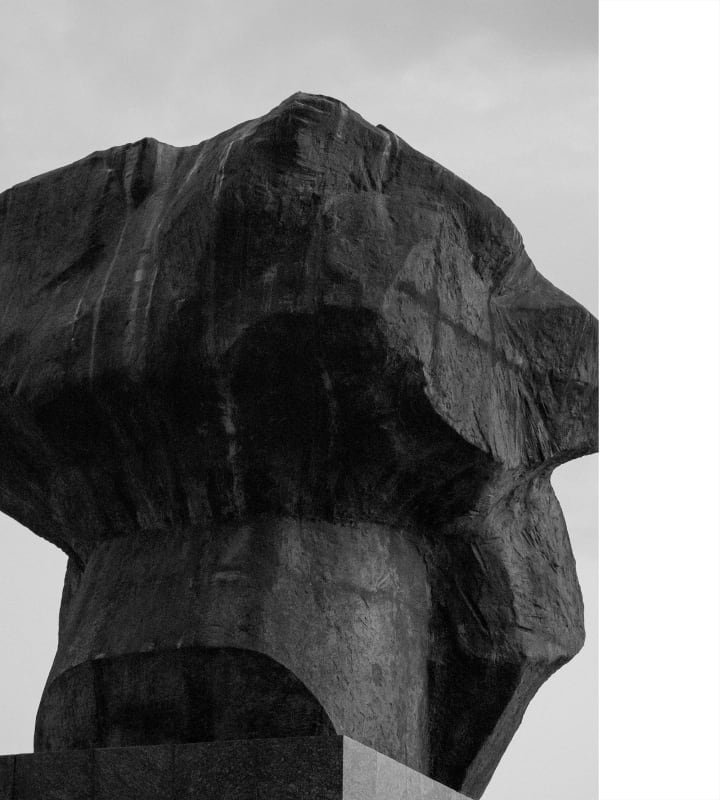Talk on February 17: DEUTSCHE REINHEIT
Based on Naika Foroutan's thesis that East Germans are also migrants, Marion Brasch, Behzad Karim Khani and photographer Tobias Kruse talk with host Anne Waak about the pressure to conform and experiences of devaluation in Germany.
The Talk begins at 19h, please arrive on time - seats are limited. Entrance fee: 3€.
For his project Deponie, Tobias Kruse sought out the traces and scars of a time that still casts a lingering shadow on the present: the years subsequent to the reunification of East Germany. A wild and paradoxical time, rich in opportunities, but one which also brought disappointment, anger and bitterness. Thirty years on from the fall of the Wall, the photographer and native of Mecklenburg, drove 8,000 kilometers through Eastern Germany, capturing what is left in the wake of this monumental juncture in history. A psycho-geographic exploration, Kruse documented everything from desolate countryside and rural villages to packed football stadiums and nighttime demonstrations – phenomena that are as much historical as they are contemporary in their integral space in Germany’s collective memory.
Kruse began his journey in Ihlenberg landfill (Deponie), near Schwerin, where he grew up, experiencing the early nineties as a teenager. A decade previously, in the eighties, hazardous waste from Western Europe was routinely disposed of in this landfill - known as VEB Deponie Schönberg - a publicly owned enterprise. The East was the recipient of foreign currency that allowed the West to dump its waste cheaply elsewhere. Even then, the damage to local people and the environment was devastating - the construction of the landfill was based on a decision by the Politburo (government) and was also illegal under GDR law. There were no serious environmental regulations or controls at the time, and as a result Schönberg quickly became the largest toxic waste dump in Europe.
After the fall of the Wall, the conventional procedure of West Germany’s script of
reunification followed: takeover of the former public property for cosmetic rehabilitation by the state and finally a highly expensive sale. Local people were reduced to background actors in their new lives, and the landfill was greened; the 17 million tons of toxic waste, however, still lies beneath this seemingly flourishing landscape. And in the same way, although the specific location has disappeared over time, what has remained, along with the name Deponie, is the ominous mood.
The scar embedded in the shaved head is not the only relict to come from a period which followed two German dictatorships in the East, but also the suspicion of state organizations and decisions, as well as a residual anger that continues to throb in the temples of East Germans today. The insecurity and loss of control are echoed sadly in our current time, boldly reimagined in the echo chambers of the New Right. Tobias Kruse has filtered out his discomfort with this during his travels and amplified it in his black-and-white photographs. They act as a hinge between the past and present, expressive of how deep the wounds still run – a yearning for healing that still feels a long way off. In the end, his dark images leave a sombre and poignant uneasiness, one for the viewer to reflect on and sit with far beyond the gallery space. (Laura Benz)
The series was created in 2019 and 2020 as part of the recommended Olympus Fellowship program and has been exhibited at the Haus der Photographie of the Deichtorhallen in Hamburg, the Fotografie Forum Frankfurt, and FOAM Amsterdam.
The exhibition will be accompanied by a catalogue published by spectorbooks.
Tobias Kruse was born in Waren/Müritz in 1979 and grew up in Schwerin. He
studied with Prof. Ute Mahler at the Ostkreuzschule für Fotografie in Berlin and attended Prof. Arno Fischer's master class there. Kruse has been a member of the Ostkreuz agency since 2011 and works internationally. Kruse’s images have been published in books by Hatje Cantz, Hartmann Books, Kerber, spectorbooks and Steidl. Kruse lives and works in Berlin.

